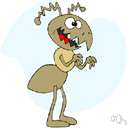termite
Also found in: Thesaurus, Medical, Encyclopedia, Wikipedia.
ter·mite
(tûr′mīt′)n.
Any of numerous pale-colored, usually soft-bodied social insects of the order Isoptera that live mostly in warm regions. Many species of termites feed on wood, often destroying trees and wooden structures. Also called isopteran, white ant.
[New Latin Termes, genus name, from Late Latin termes, termit-, woodworm, alteration of Latin tarmes.]
American Heritage® Dictionary of the English Language, Fifth Edition. Copyright © 2016 by Houghton Mifflin Harcourt Publishing Company. Published by Houghton Mifflin Harcourt Publishing Company. All rights reserved.
termite
(ˈtɜːmaɪt)n
(Animals) any whitish ant-like social insect of the order Isoptera, of warm and tropical regions. Some species feed on wood, causing damage to furniture, buildings, trees, etc. Also called: white ant
[C18: from New Latin termitēs white ants, pl of termes, from Latin: a woodworm; related to Greek tetrainein to bore through]
termitic adj
Collins English Dictionary – Complete and Unabridged, 12th Edition 2014 © HarperCollins Publishers 1991, 1994, 1998, 2000, 2003, 2006, 2007, 2009, 2011, 2014
ter•mite
(ˈtɜr maɪt)n.
any of numerous pale-colored, soft-bodied, chiefly tropical, social insects of the order Isoptera that feed on wood, some being highly destructive to buildings, furniture, etc. Also called white ant.
[1775–85; taken as singular of New Latin termites, pl. of termes white ant, Latin tarmes wood-eating worm]
Random House Kernerman Webster's College Dictionary, © 2010 K Dictionaries Ltd. Copyright 2005, 1997, 1991 by Random House, Inc. All rights reserved.
ter·mite
(tûr′mīt′) Any of numerous pale-colored insects that live in large colonies and that feed on and destroy wood. Termites resemble ants in their appearance, manner of living, and social organization, but they belong to a different order of insects.
The American Heritage® Student Science Dictionary, Second Edition. Copyright © 2014 by Houghton Mifflin Harcourt Publishing Company. Published by Houghton Mifflin Harcourt Publishing Company. All rights reserved.
ThesaurusAntonymsRelated WordsSynonymsLegend:
Switch to new thesaurus
| Noun | 1. |  termite - whitish soft-bodied ant-like social insect that feeds on wood termite - whitish soft-bodied ant-like social insect that feeds on woodinsect - small air-breathing arthropod Isoptera, order Isoptera - order of social insects that live in colonies, including: termites; often placed in subclass Exopterygota dry-wood termite - any of various termites that live in and feed on dry wood that is not connected with the soil Reticulitermes flanipes - destructive United States termite Reticulitermes lucifugus - destructive European termite Mastotermes darwiniensis - Australian termite; sole living species of Mastotermes; called a living fossil; apparent missing link between cockroaches and termites Mastotermes electromexicus - an extinct termite found in amber in southern Mexico Mastotermes electrodominicus - extinct termite found in amber in the Dominican Republic |
Based on WordNet 3.0, Farlex clipart collection. © 2003-2012 Princeton University, Farlex Inc.
termite
nounRelated words
habitation termitarium
habitation termitarium
Collins Thesaurus of the English Language – Complete and Unabridged 2nd Edition. 2002 © HarperCollins Publishers 1995, 2002
Translations
نَمل أبْيَض يَقْرُض الخَشَب
termit
termit
termesz
termíti
termitas
termīts
termit
termit
ak karıncatermit
Collins Spanish Dictionary - Complete and Unabridged 8th Edition 2005 © William Collins Sons & Co. Ltd. 1971, 1988 © HarperCollins Publishers 1992, 1993, 1996, 1997, 2000, 2003, 2005
termite
[ˈtɜːrmaɪt] n → termite m
modif [mound, colony] → de termitesterm paper n (US) → dissertation f (à la fin du trimestre)terms of reference npl → termes mpl de référence
Collins English/French Electronic Resource. © HarperCollins Publishers 2005
termite
n → Termite f
Collins German Dictionary – Complete and Unabridged 7th Edition 2005. © William Collins Sons & Co. Ltd. 1980 © HarperCollins Publishers 1991, 1997, 1999, 2004, 2005, 2007
Collins Italian Dictionary 1st Edition © HarperCollins Publishers 1995
termite
(ˈtəːmait) noun a pale-coloured wood-eating kind of insect, like an ant.
Kernerman English Multilingual Dictionary © 2006-2013 K Dictionaries Ltd.